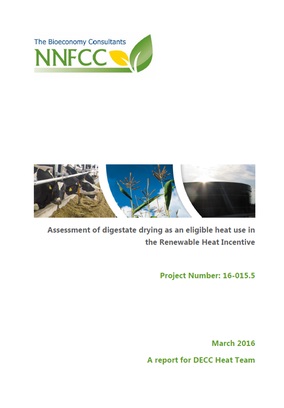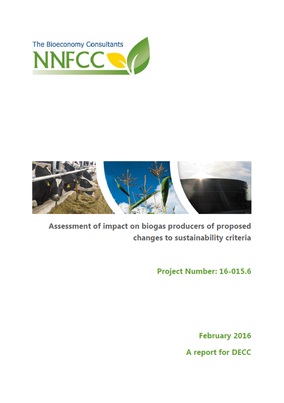Back in March this year, the Government released a consultation for the Renewable Heat Incentive: a reformed and refocused scheme. Stakeholders had their chance to give their views on the proposals set out by the Department for Business Energy & Industrial Strategy (previously DECC). A total of 370 stakeholders responded, expressing a wide range of views, and BEIS finally published their response yesterday (14th Dec).
The changes announced will inevitably impact the biomass, biogas and biomethane sectors; BEIS state to “vastly improve the carbon cost-effectiveness of further support”. Some of the changes will be a boost for industry, including an increase in tariffs for biomethane and domestic biomass, and the maintenance of the biogas tariff which will not degress in January. While others will cause some headaches.
The headline reforms are set to be implemented for new
applications from spring 2017 unless otherwise stated as follows:
Domestic
RHI:
- Biomass tariffs reinstated to levels available between October and December 2015
- New ‘heat demand limit’ to ensure larger properties are not over-compensated
- ‘Assignment of rights’ will become possible (but not by Spring 2017)
Non-Domestic
RHI:
Biomass:
- Three current tariff bands will be replaced with a single tiered tariff, with the ‘tier threshold’ at 35% of plants’ capacity (effective from 14 December 2016)
- No further changes to biomass-CHP
Biogas & Biomethane
- Biomethane tariffs will be reset to levels applicable between April and June 2016
- Biogas tariffs will be maintained at the current (October to December 2016) levels; the 25% degression recently announced to take effect from 01 January 2017 will not take effect
- New biogas and biomethane plant will only receive support on all heat or biomethane produced if at least 50% of the biogas or biomethane is derived from wastes or residues; excess generation (i.e. >50%) from non-wastes and residues will not be supported.
- Plants commissioning between 14 December 2016 and the date the new regulations come into force will have a choice of which set of rules they fall under.
Tariff guarantees:
- Tariff guarantees will be introduced for large biomass boilers (>1MWth), large biogas plants (>600kWth), all capacities of biomethane and biomass-CHP.
- There is provision for Government to close the tariff guarantee process
- There will be a limit on the amount of heat (or biomethane) that can be covered by a single tariff guarantee
- No guarantee can be provided into the next Spending Review period, so plant must commission or commence biomethane injection on or before 31 December 2019.
Tariff guarantee process will be three-fold:
- Stage 1: Provisional approval for a tariff guarantee (when financial close is imminent); requires proof of planning permissions, a declaration of intent to reach financial close, maximum capacity of the plant, evidence of the proposed heat use, provisional commissioning date
- Stage 2: Application for a full tariff guarantee – must be made within 3 weeks of Stage 1 approval being granted, with evidence that financial close has been reached
- Stage 3: Application for full accreditation or registration, no sooner than and no more than 6 months after the provisional commissioning date provided in Stage 1 (and no later than 31 December 2019)
Other key points:
- Assignment of rights will not be introduced in non-domestic RHI
- Drying digestate will no longer be eligible for support (applies to new participants only)
- Drying of wood fuel and aquaculture will both be subject to further review
- Government planning to consult on the option of introducing an annual heat production limit for each individual participant
- Tariff guarantees will now contribute to the degression forecasting, from the point they are granted
- Minor changes have been made to the degression mechanism, allowing degression to be reduced once technology-specific growth slows (even if still deploying over-budget)
Reasoning behind RHI reform
BEIS claim these reforms will offer better value for money
while ensuring long term de-carbonisation using the right technologies for the
right uses.
Alongside the consultation response, two independent reports
written by NNFCC were published detailing some of the evidence used to inform
policy decisions. NNFCC were commissioned by DECC (now BEIS) to assess digestate
drying as an eligible use of the RHI, and the impact
on biogas producers of proposed changes to sustainability criteria.
 Despite making it easier to transport and store digestate,
NNFCC’s report indicates the drying process is not a widespread appropriate use
of RHI budget, without further restrictions which would be complex to implement
other than on a case by case basis. Transport of unprocessed digestate up to
100 km has been shown to be more economical and emit less GHGs than digestate
drying, due to the high energy demand. The widely used mechanical techniques of
dewatering digestate, and newer technologies for separating fractions, could be
deployed by those unable to finance thermal treatment to reach higher value
markets. Other uses of renewable heat may be more beneficial to deliver real
carbon savings, such as supplying local heat customers and process heat demand.
Despite making it easier to transport and store digestate,
NNFCC’s report indicates the drying process is not a widespread appropriate use
of RHI budget, without further restrictions which would be complex to implement
other than on a case by case basis. Transport of unprocessed digestate up to
100 km has been shown to be more economical and emit less GHGs than digestate
drying, due to the high energy demand. The widely used mechanical techniques of
dewatering digestate, and newer technologies for separating fractions, could be
deployed by those unable to finance thermal treatment to reach higher value
markets. Other uses of renewable heat may be more beneficial to deliver real
carbon savings, such as supplying local heat customers and process heat demand.
NNFCC’s analysis of crop supply chains used in AD, showed
that many crops are able to demonstrate a 70% reduction in GHG emissions
compared to the fossil fuel comparator. Typically, the best GHG savings were
achieved on sugar beet and maize, while grass silage was the poorest compared
to other crops. However, nitrogen fertilisers and crop yields have a big impact
on emissions; whereas, transport has little impact. The analysis highlights the
complexity of setting the GHG levels to indirectly limit crops, as there are many
variables and assumptions in each supply chain and cropping system. This is
potentially why the Government have chosen a more direct restriction on use of crops.
 Limiting purpose grown crop inputs into AD is a good step in
the direction to increase valorisation of waste (see the project AgroCycle which we are heavily involved, to read more about waste valorisation). However, there are still many barriers
to accessing waste in the current system, particularly legislative and market
barriers. Our AD
Deployment report shows the rate of uptake on waste feedstocks has begun to
level off for new plants, signalling a shortage of available biowaste. Policy
around waste is very complex, restricting use of certain types of waste and use
of digestate produced by wastes. In addition, local councils retain 20 year-long
contracts with waste management companies, making it difficult to access post-consumer
food waste, one of the largest biowaste feedstocks generated, as shown in our
report for WRAP ‘The Organics and Recycling Industry 2015’ to be published soon.
Much of this bio-waste ends up exported, in landfill or increasingly
incinerated.
Limiting purpose grown crop inputs into AD is a good step in
the direction to increase valorisation of waste (see the project AgroCycle which we are heavily involved, to read more about waste valorisation). However, there are still many barriers
to accessing waste in the current system, particularly legislative and market
barriers. Our AD
Deployment report shows the rate of uptake on waste feedstocks has begun to
level off for new plants, signalling a shortage of available biowaste. Policy
around waste is very complex, restricting use of certain types of waste and use
of digestate produced by wastes. In addition, local councils retain 20 year-long
contracts with waste management companies, making it difficult to access post-consumer
food waste, one of the largest biowaste feedstocks generated, as shown in our
report for WRAP ‘The Organics and Recycling Industry 2015’ to be published soon.
Much of this bio-waste ends up exported, in landfill or increasingly
incinerated.
Industry Response
 Lucy Hopwood, NNFCC has stated: “The long-awaited Government
response to the RHI reform has been released and we are pleased to see no real
surprises. The reforms offer a glimmer of hope for the bioenergy sectors and it
is pleasing to see so many industry-asks have been taken on-board. However,
there are still evident risks and the question is now how long the positivity
may last as the introduction of tariff guarantees and resetting of tariffs may
appear to be good news but the reality is the more successful the industry from
early next year, the quicker the tariffs will reduce and the greater the risk becomes
of early scheme closure. ”
Lucy Hopwood, NNFCC has stated: “The long-awaited Government
response to the RHI reform has been released and we are pleased to see no real
surprises. The reforms offer a glimmer of hope for the bioenergy sectors and it
is pleasing to see so many industry-asks have been taken on-board. However,
there are still evident risks and the question is now how long the positivity
may last as the introduction of tariff guarantees and resetting of tariffs may
appear to be good news but the reality is the more successful the industry from
early next year, the quicker the tariffs will reduce and the greater the risk becomes
of early scheme closure. ”
We are already helping our clients navigate the
complexities, identify their options and develop their preferred pathways – if
you need help understanding what this all means for you, don’t hesitate to
contact us.
Lucy Hopwood
Lead Consultant - Bioenergy & Anaerobic Digestion